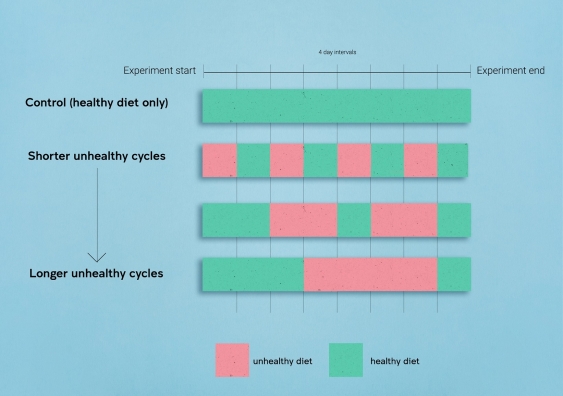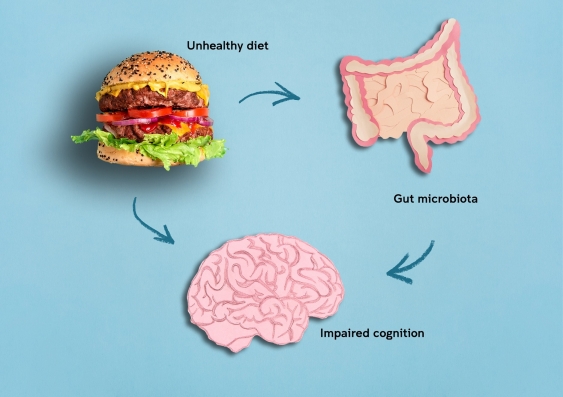Diet cycling impacts spatial memory: rat study
UNSW research in rats shows that cycling between a healthy and unhealthy diet has significant health effects.
UNSW research in rats shows that cycling between a healthy and unhealthy diet has significant health effects.

We all know this scenario. You’ve been sticking to a healthy diet, then the weekend rolls around. Pub meals, greasy fry-ups, takeaway dinners… None of that matters as long as you ate healthily during the week, right?
A UNSW Sydney study in rats, published in Molecular Nutrition and Food Research, opens in a new window, shows that cycling between a healthy and unhealthy diet impacts spatial memory. The research was undertaken by Dr Mike Kendig and Professor Margaret Morris, Head of Pharmacology at UNSW Medicine & Health.
This research is important as junk foods are a central part of modern diets, but most of us don’t eat them 100 per cent of the time. People often take part in ‘diet cycling’, alternating between periods of healthy and unhealthy eating. A common pattern is adopting a poorer quality diet on weekends.
Previous research shows that high-fat, high-sugar diets are associated with poorer cognition in humans and rats. However, the effects of diet cycling are not well understood.
“Mike and I wanted to know whether the same total amount of unhealthy food, but in different sized chunks, would have the same impact,” said Prof. Morris.
“Our lab has been looking at the nexus between high-fat diet, high-sugar diet and cognition using a rat model,” said Prof. Morris.
In this study, adult male rats were exposed to a healthy diet of standard rat food. Some rats were also exposed to 16 days of an unhealthy ‘cafeteria’ diet, consisting of standard food plus high-fat, high-sugar, processed foods. This 16 days of unhealthy diet was done in one stretch, or broken up into shorter or longer ‘cycles’ (see diagram below).

During the experiments, rats were exposed to healthy and unhealthy diets for varying durations. Note that this diagram is illustrative only and does not fully reflect the experimental design. Image: Ian Joson.
Rats exposed to the unhealthy diet variations performed more poorly on spatial memory tests, where they had to remember the placement of objects. The memory impairment was more noticeable for rats who followed the high-fat, high-sugar diet for more consecutive days – in other words, longer unhealthy diet cycles.
The unhealthy diet also led to changes in the gut microbiome. This included less diversity in the microbial species present, higher levels of ‘bad’ bacteria associated with obesity, and lower levels of ‘good’ bacteria associated with weight control. These effects became more severe with longer unhealthy diet cycles.
All of the rats fed the unhealthy diet gained more weight than controls fed the healthy diet by the end of the experiment. However, the length of the ‘unhealthy cycle’ had little impact. In other words, the effects on cognition and gut microbiome appeared to be independent of weight gain.
So why did the unhealthy diet impact the rats’ memory? It’s likely that several factors are at play – one being the gut microbiome.
"Our analyses indicated that the levels of two bacteria correlated with the extent of the memory impairment. This suggests a link between the effects of diet cycling on cognition and the microbiota,” said Dr Kendig, who undertook this research at UNSW and now researches diet and cognition at the Faculty of Science at University of Technology Sydney (UTS).
Prof. Morris added: “We know the gut is very connected to our brain. Changes to the microbiome in response to our diet might impact our brain and behaviour.”
Read more: An apple a day on doctors' orders keeps ill health away
Another reason could be that an unhealthy diet contributes to inflammation in the body.
“In humans we know that a diet that increases inflammation appears to be less beneficial for our brain function,” said Prof. Morris. “And in the past, we’ve shown in rats that these cognitive deficits actually correlate with inflammation in the brain.”
Concerningly, eating unhealthy foods may also directly affect the structure of the brain. Previous research shows that a high-fat, high-sugar diet may reduce the size and function of a brain area called the hippocampus, which is essential for learning and memory.

Diet is thought to affect cognition directly through inflammation and structural changes to the brain, as well as indirectly due to changes in the gut microbiota. Image: Ian Joson.
Further research is needed to understand exactly why the diet cycling impacted the rats’ memory, and how well this translates to humans.
However, Prof. Morris said that the key takeaway is that even subtle shifts in dietary habits can impact our thinking and memory. Regular, long stretches of healthy eating are probably important for our cognition.
“We think this sort of work is critical to get us to think about maintaining the health of our brain into old age,” Prof. Morris said.
“If we can maintain a healthy diet – such as the Mediterranean-type diet with high diversity, fruits, vegetables, low saturated fats, good proteins – we have a better chance of preserving our cognition.”